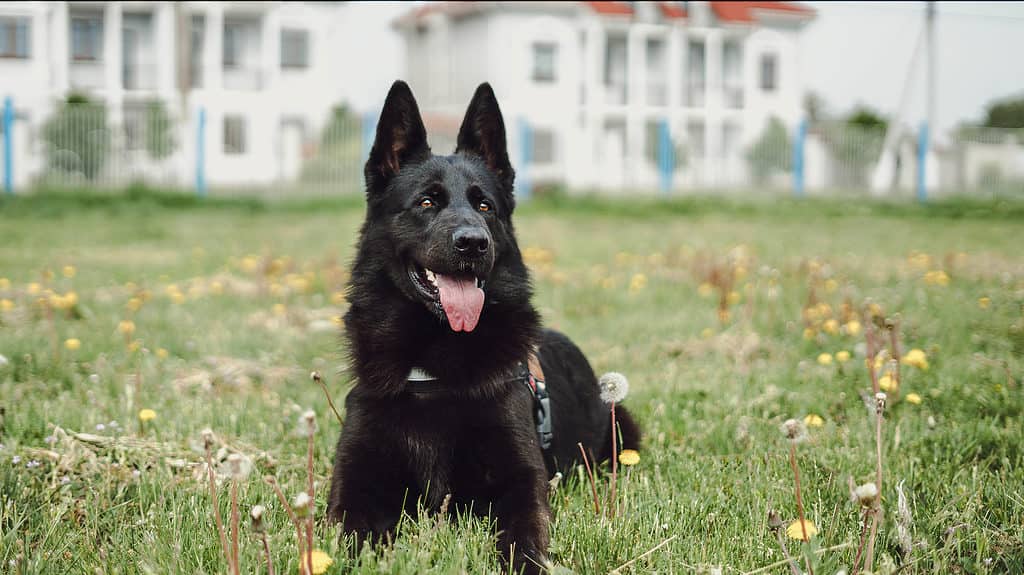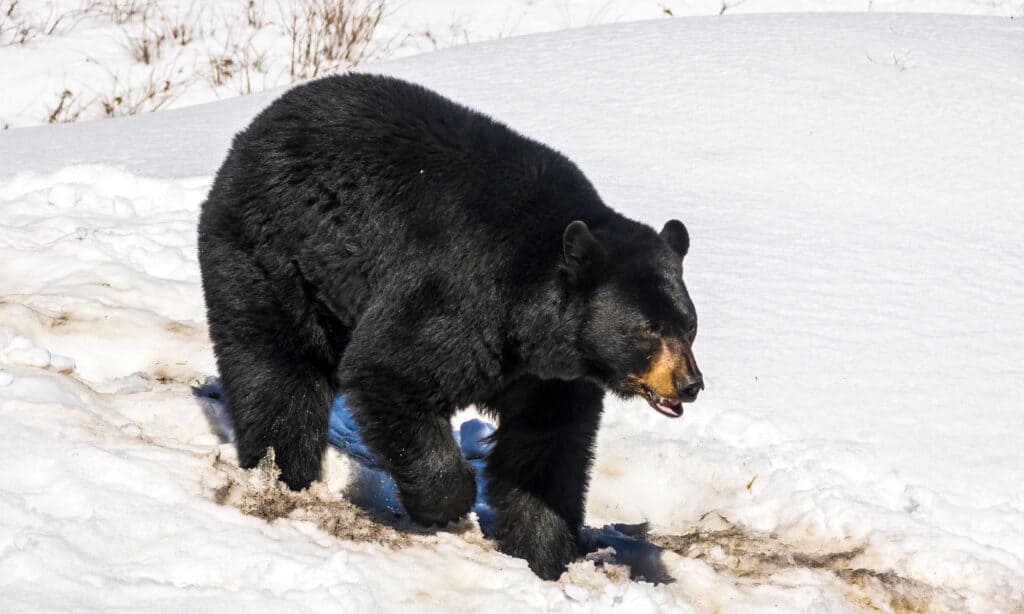Black bears have an acute sense of smell and are able to track a scent from over a mile away. They also have excellent hearing, which makes up for their poor long-distance eyesight. They grow to be intimidatingly large, but despite their appearance, they’re rather curious and non-aggressive. However, the mothers get fiercely defensive when it comes to protecting their cubs. They display several behaviors if they sense a threat. Their objective is to scare it off instead of engaging further. However, these animals are massive and powerful, able to swim and climb well, and capable of taking down huge prey as big as elk. But in a German shepherd vs. bear rumble, which animal would win?
German shepherds are beloved dogs for their loyal companionship, their protective natures, and their ability to learn just about any task. These dogs are literal “ride or die” companions, often serving their human counterparts in the military, in police forces, and as service dogs for those with disabilities. They’re impressively brave and literally put themselves in the face of danger to protect their loved ones. Although there is a notable size difference between these two animals, they each have strengths that can’t be denied.
German Shepherd vs. Black Bear Comparison
| German Shepherd | Black Bear | |
|---|---|---|
| Size | 24 – 26 inches for males 22 – 24 inches for females | 50 – 75 inches for males 50 – 75 inches for females |
| Weight | 65 – 90 pounds for males 50 – 70 pounds for females | 130 – 660 pounds for males 90 – 175 pounds for females |
| Lifespan | 7 – 10 years | 10 – 30 years |
| Diet | Dog food, including kibble, canned, raw, and homemade | Insects, fruit, berries, sedges, and fish (sometimes deer and moose) |
| Temperament | Intelligent and loyal; energetic and friendly; somewhat reserved | Curious and aggressive when threatened |
| Bite Force | 238 PSI | 800 PSI |
Overview: German Shepherd
German shepherds are largely regarded as all-around helpers. These dogs are big with muscular bodies and great agility. They’re also recognized for their impressive intelligence and loyal natures. They have an easy trot, but they can move fast when needed. Although their physical abilities stand on their own, it’s ultimately this dog’s character that makes many dog lovers want to bring this breed this home.
They’re confident, courageous, and respond well to training. They’re protectors at the end of the day and won’t hesitate to place themselves in danger to defend the ones they love. Although they display such noble characteristics, they’re not quick to warm up and may initially appear quite reserved and perhaps indifferent.
Size and Appearance
These dogs stand tall at 26 inches for males and have a distinctive black and tan medium double coat. Other standard colors include black and cream, black and red, black and silver, blue, gray, liver, sable, and white. This dog is proportioned well with a broad head and sharp muzzle. Their ears are big and stand proud on either side of their heads. Their bodies are muscular, and they have downward-turning bushy tails.
Life History and Temperament
German shepherds come from German herding dogs. Captain Max von Stephanitz, a German cavalry officer, had a vision of the best German herder. He and other breeders who shared a similar vision worked together to crossbreed several strains from different parts of the country, which is what led to the German shepherd that is known and revered today. Although the initial quest was to breed a dog that herded sheep, German shepherds are now known for their abilities to carry out a wide variety of tasks. They are extremely loyal, bold, and committed, which is why they frequently take on roles as service and police dogs.

German Shepherds are brave and loyal to their owners. They will aggressively protect their loved ones from strangers.
©lisovyleo/Shutterstock.com
Overview: Black Bear
Black bears are the smaller counterparts of brown bears, which are often referred to as grizzlies. These bears, though land dwellers, have fantastic swimming abilities. They are also excellent fishers that love to snack on salmon as well as roots and berries throughout the summer. Not only are they great swimmers, but they’re also great at climbing trees. They may even use a tree as a makeshift bed for a quick nap. Aside from their usual foods, black bears may also eat tiny insects and large prey like deer and moose. Ultimately, their goal is to fatten up before winter rolls around and they have to hibernate.
Size and Appearance
If you measure a black bear from its tail all the way over to its nose, it is about four to seven feet long. When standing on all fours, their shoulders are about three to four feet off the ground. Their snouts are long, their ears are round, and their eyes are rather small. The seasons affect the appearance of their fur. Sometimes it looks kind of unkempt whereas other times it looks smooth. Although you might think they’re only black based on their name, they are also sometimes brown and cinnamon (on occasion they’re blond, bluish-gray, or white).
Life History and Temperament
Typically, black bears live a solitary life (unless it’s mating season or it’s a mama bear with cubs). After fertilization, the mothers find a den, and around the same time, the embryo implants. This is how the mother bear’s body protects itself to ensure she is safe to continue through the gestation period. So long as there is plenty of sustenance, female black bears give birth every two years.
The cubs stay with their mothers until 1.5 years when they eventually move on to live on their own and she has a chance to mate again. They can live up to 30 years old but often, they die at a much younger age in the wild. These are inquisitive creatures, using their sense of smell to get a sense of their environment. If they feel threatened, they slap the ground, snap their teeth, or blow air out of their noses.
Interestingly, if a black bear has decided to act out its aggression, it does not posture or display any warning signs. Instead, it stays rather still, it sticks out its bottom lip, and it flattens its ears. At this point, they use all tools at their disposal to take down the target. That may mean knocking someone over, using their claws, biting, and eventually going for the head to disable the threat.

Black bears are curious and non-aggressive, but mothers get fiercely defensive when it comes to protecting their cubs.
©Josef Pittner/Shutterstock.com
German Shepherd vs. Bear: Who Would Win?
Although black bears trump German shepherds in size, German shepherds are a lot bolder and more courageous. They may show more aggression, particularly if they’re protecting their loved ones. Because of their inherent desire to protect and their fiercely loyal personalities, they may manage to scare a black bear away. These dogs are persistent, they don’t stand down, and they do not mind facing a threat head-on when they’re activated.
This kind of behavior may confuse a black bear, which usually intimidates other animals with its size alone. Black bears are naturally curious creatures. Even when they stand on their two hind legs, they may just be trying to sniff the air or get a better view of their surroundings. They don’t typically display aggression unless they’re feeling threatened or they’re actively hunting. Even when feeling threatened, they may bluff charge to try and ease a threat. Their aim, usually, is to understand their environment better.
They usually retreat if faced with a potential opponent. That’s not to say they don’t harbor incredible, bone-crushing strength. They can kill mammals as big as moose, after all. In the case of a full-out brawl between a black bear and a German shepherd, bears are much more powerful, both with their claws and their bites. They could dominate a German shepherd, severely injure it, and worse. A German shepherd would be smart to retreat from an aggressive black bear because it would certainly win a fight against a German shepherd if it came down to it.
The photo featured at the top of this post is ©
Thank you for reading! Have some feedback for us? Contact the AZ Animals editorial team.







